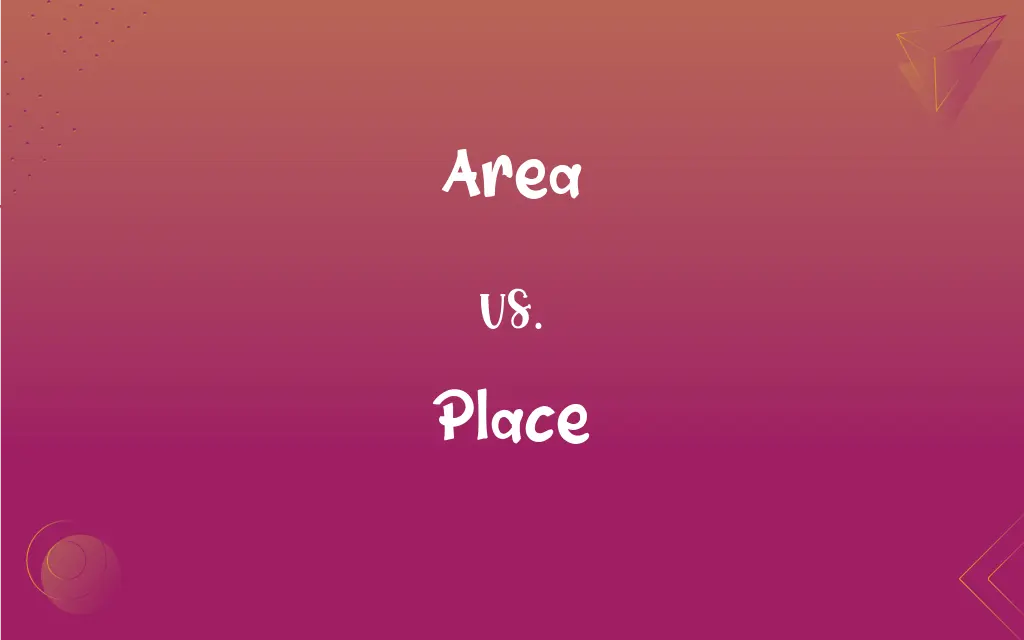Area vs. Place: What's the Difference?
Edited by Harlon Moss || By Janet White || Published on December 27, 2023
Area refers to a measurable extent of a surface or a distinct part of space, whereas place denotes a specific point or location, often with a particular purpose or significance.

Key Differences
An area is a specific part of a space or surface, often quantifiable in terms of square units, while a place is a distinct location, which can be as small as a point or as large as a country.
The term 'area' is often used in mathematical or geographical contexts to describe the size or extent of a surface, whereas 'place' is used to denote a particular location with a specific identity or purpose.
Area can also refer to a subject or a range of subjects, as in "area of study," while a place is more about the physical or conceptual position of something or someone.
In terms of human interaction, we often talk about area in a general sense, like a residential area, but place is more specific, such as a favorite restaurant or a historic site.
An area can overlap or contain several places, but a place is usually defined as a distinct part of an area, often with its own unique characteristics.
ADVERTISEMENT
Comparison Chart
Definition
A measurable extent of space or surface
A specific point or location
Usage Context
Mathematical, geographical
Physical or conceptual location
Scale
Can be large or small, often quantifiable
Specific, often with identifiable characteristics
Human Interaction
Generally refers to broader regions or subjects
Indicates specific locations or points of interest
Overlap
Can contain multiple places
Defined as part of an area
ADVERTISEMENT
Area and Place Definitions
Area
Area refers to the extent or measurement of a surface or piece of land.
The total area of the park is 50 square kilometers.
Place
It can mean a building, area, town, or country.
Paris is a place I've always wanted to visit.
Area
In a broader sense, area can denote a part of a town, a country, or the world.
They live in a rural area outside the city.
Place
Place can also signify a role or position in a situation or sequence.
He earned first place in the competition.
Area
It can refer to a section of a place, distinguished by a particular characteristic.
The dining area is separated from the kitchen.
Place
Place refers to a particular position, point, or location in space.
She put the book back in its place on the shelf.
Area
Area can also mean a subject or field of interest or activity.
She specializes in the area of environmental science.
Place
Place is used to refer to a seat or space for someone or something.
Is this place taken?
Area
Area is also used in geometry to describe the size of a flat surface.
Calculating the area of a circle requires knowing its radius.
Place
In a broader context, place can mean a particular point in a book or other piece of writing.
Please mark your place in the book before closing it.
Area
A roughly bounded part of the space on a surface; a region:a farming area; the New York area.
Place
An area with definite or indefinite boundaries; a portion of space.
Area
A surface, especially an open, unoccupied piece of ground:a landing area; a playing area.
Place
Room or space, especially adequate space
There is place for everyone at the back of the room.
FAQs
Can area be used in non-geographical contexts?
Yes, area can refer to subjects or fields of interest, like an area of study.
Can the word 'place' imply belonging?
Yes, place can imply belonging, as in "finding one's place in the world."
Can an area be a place?
Yes, an area can be a place, but it's usually a larger or more general space.
Is place used to measure space?
No, place is not used for measurement but to identify a specific location or position.
Can a place have cultural significance?
Yes, many places have cultural, historical, or personal significance.
Is a place always a specific location?
Yes, a place typically refers to a specific location or point.
Can a place be intangible?
Yes, place can be conceptual, like a place in a story or a person's heart.
Are areas always large?
Not necessarily, an area can be any size, but it's often larger than a place.
Can the word 'place' be used in a temporal sense?
Yes, place can be used to refer to a point in time, although it's less common.
Is the concept of place important in geography?
Yes, in geography, place is crucial for identifying specific locations on Earth.
Can an area change over time?
Yes, areas can change in size, shape, or character over time.
How do you calculate the area of a space?
The area is calculated based on the shape and dimensions of the space, using mathematical formulas.
Is area always a physical space?
Mostly, but it can also refer to abstract spaces, like areas of knowledge.
How do maps represent areas and places?
Maps represent areas in terms of their size and location, while places are marked as specific points.
Do places have boundaries?
Yes, places often have physical or conceptual boundaries.
Are all places within areas?
Generally, yes, as places are specific locations within broader areas.
Can area and place be used interchangeably?
While they have overlapping meanings, they are not always interchangeable due to their specific connotations.
Is a home considered a place or an area?
A home is typically considered a place due to its specific and personal nature.
Can an area have different places within it?
Yes, an area can encompass multiple different places.
How is place related to identity?
Place can be closely tied to a person's identity, especially if it holds personal or cultural significance.
About Author
Written by
Janet WhiteJanet White has been an esteemed writer and blogger for Difference Wiki. Holding a Master's degree in Science and Medical Journalism from the prestigious Boston University, she has consistently demonstrated her expertise and passion for her field. When she's not immersed in her work, Janet relishes her time exercising, delving into a good book, and cherishing moments with friends and family.
Edited by
Harlon MossHarlon is a seasoned quality moderator and accomplished content writer for Difference Wiki. An alumnus of the prestigious University of California, he earned his degree in Computer Science. Leveraging his academic background, Harlon brings a meticulous and informed perspective to his work, ensuring content accuracy and excellence.






































































